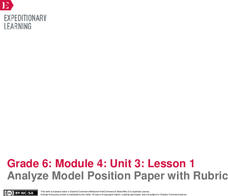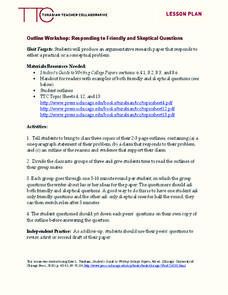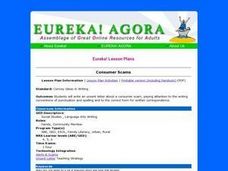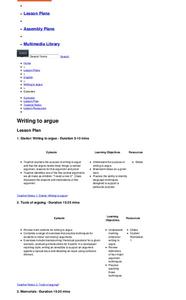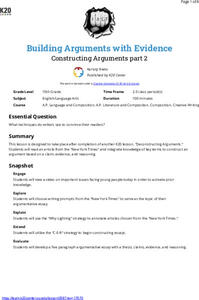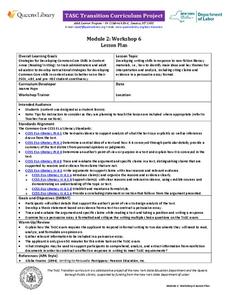Curated OER
Argumentative/Persuasive Writing
Intended for an intermediate/advance ELD course, this resource can support anyone learning the techniques and discernment needed for effective persuasive/argumentative writing. Beginning with the issue of curfews for a quick class...
Prestwick House
Writing Arguments in Response to Nonfiction
Emotional appeal or argument? That is the question. An informative instructional activity helps your class recognize the difference between a logical argument and an emotional appeal and learn how to craft an argumentative response....
Turabian Teacher Collaborative
Parts of Argument II: Article Critique
Break down the parts of argumentative writing with a critical thinking activity. High schoolers read an article of your (or their choice), and use a graphic organizer to delineate the ways the author structures his or her arguments.
ReadWriteThink
Persuasive Essay: Environmental Issues
Young environmentalists learn how to craft a persuasive essay about an environmental issue they consider important. After studying the components of a persuasive essay and examining a student model, writers brainstorm possible topics and...
EngageNY
Analyze Model Position Paper with Rubric
It's time to choose a position! Scholars read a model position paper about fracking to practice identifying the topic and argument. Then, working with a partner, they use a rubric to assess the essay.
EngageNY
Planning for Writing: Introduction and Conclusion of a Literary Argument Essay
After completing three body paragraphs of an argument essay about life's rules to live by from Bud, Not Buddy Christopher Paul Curtis, it's time to begin writing the introduction and conclusion. Independently, pupils draft the final two...
Turabian Teacher Collaborative
Outline Workshop: Responding to Friendly and Skeptical Questions
Answering questions is the best way to hone and revise your argument. Foster receptive writers with a workshop activity that promotes peer editing and argumentative writing skills. Given lists of both friendly and skeptical questions,...
Curated OER
Convey Ideas in Writing
Use the platforms of the 2004 presidential candidates to bring persuasive writing to your class. Young voters identify the three issues most important to them in the election and research the issues and candidates' positions. They write...
The New York Times
I Don’t Think So: Writing Effective Counterarguments
When it comes to writing effective arguments, writers must do more than simply make a claim, counterarguments must be considered. Aspiring writers analyze counterarguments in editorials, and then learn how to write counterarguments in...
Turabian Teacher Collaborative
How to Find a Research Question
There are so many fascinating topics and concepts to learn about in the world. But where do you start? Begin formulating questions for an argumentative research paper with a guided practice lesson. After coming up with three questions...
Turabian Teacher Collaborative
Parts of Argument III: The Claim Game
Throw down with a fun language arts game! Armed with a hand of writing-themed cards, learners craft arguments based on the strategies written on the cards, dropping cards as they discuss their claims further until there are no strategies...
Curriculum Corner
Guest Teacher Plans: Grade 6
Taking a day off of school can feel like a lot more work than going because of the time and effort that goes into making sub plans. Make your life easier with a daily plan for a guest teacher designed to meet the needs of sixth graders...
Curated OER
Writing to Argue
Students write an argument using a clear structure and argumentative techniques. In this persuasive writing instructional activity, students brainstorm, write, and peer edit an argumentative essay. Worksheets include the prompt, facts...
Newseum
Slanted Facts and Slippery Numbers
The Internet is known as the information superhighway, but sometimes it's hard to know when to hit the brakes on unreliable sources. Using a well-rounded lesson plan, pupils read and summarize articles about the gender pay gap and...
Anti-Defamation League
Should Washington's NFL Team Change Their Name?
"What's in a name?" Is it irrelevant, as Juliet suggests in Shakespeare's play, or is nomenclature deeply significant? Young scholars weigh in on the debate by examining the controversy over the NFL's Washington, D.C. Redskins. Groups...
K20 LEARN
Building Arguments With Evidence: Constructing Arguments Part 2
The second session in the two-part "Building Arguments with Evidence" lesson asks scholars to craft an argument essay on a topic of interest to them. Writers establish a claim, locate evidence, and justify their stance.
Turabian Teacher Collaborative
My Favorite Martian: Workshopping Warrants
Sometimes explaining an argument can lead to confusion and miscommunication. Narrow down the details in written arguments with a group activity in which learners pretend to be aliens from another planet, struggling to understand each...
EngageNY
TASC Transition Curriculum: Workshop 6
Is a college education necessary for success in today's world? The class investigates the question, along with others at the end of the sixth workshop in a 15-part series. The lesson has four parts with multiple activities and...
Curated OER
Argumentation and Logic
Students recognize inductive and deductive reasoning and analyze common fallacies in critical thinking. In this argumentation and logic instructional activity, students use role playing activities and specific instances of inductive and...
EngageNY
Contrasting Evidence: “Games Can Make a Better World” and “Video Games Benefit Children, Study Finds”
Anecdotes, analogies, testimonies, statistics. The most powerful arguments rely on multiple types of evidence. Scholars explore the topic as they read contrasting evidence about the benefits of video games. They complete Venn diagrams to...
EngageNY
Evaluating Sources, Continued: The ONLINE EDUCA Debate 2009 (Part 2 of 10)
Watching videos and playing online games can be educational, but too much screen time has its drawbacks. Pupils watch a video about the topic and write down the claim, reasons, and evidence in support of reduced screen time for children....
K20 LEARN
Arguing With Evidence: Deconstructing Arguments Part 1
In the first lesson in a two-part series, high schoolers pick a social issue important to them and examine an article about the topic, the arguments and evidence used to support the writer's stance, and craft two counter-arguments to the...
EngageNY
Using Effective Search Terms: Researching Screen Time
The proof is in the reading. Scholars read an article, "Attached to Technology and Paying the Price," and answer text-dependent questions. Next, they complete a Venn diagram to contrast two authors' use of evidence on the topic of screen...
EngageNY
TASC Transition Curriculum: Workshop 15
What do a cheetah, Audi commercial, and air have in common? They're all topics of an engaging inquiry-based, hands-on workshop for educators about background knowledge, reading strategies, the CER model, and argumentative writing. The...






